Over 270,000 web retailers use Magento eCommerce to power their online enterprises, making it the ultimate ecommerce platform globally. Besides, there are 10 million products listed on Magento’s website at writing, ranging from shoes to apparel, home goods to electronics.
In 2021, Magento was one of the top three most popular platforms for merchants to migrate from. However, only a minority have chosen other carts too! (Source: Litextension’s in-house data)
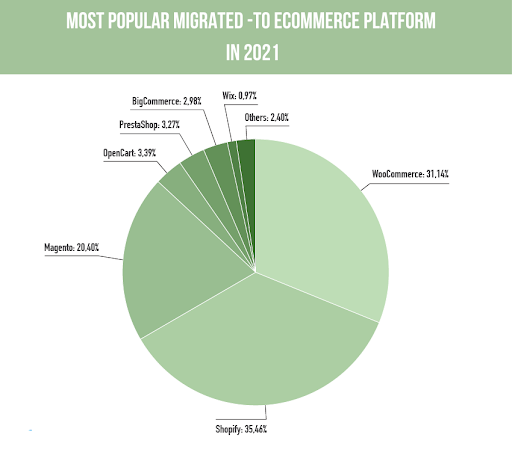
As you can see, it’s a hugely popular platform, but that popularity also comes with some downsides – although they’re not permanent ones!
This article will focus on Magento’s benefits and some of its disadvantages because you need to know what you’re getting before you dive in and start using it.
Let’s examine some of Magento’s eCommerce pros and cons.
15 Magento eCommerce Platform Pros and Cons
Like any other tool, Magento, too, has two sides of coin-good & evil. Here are some pros and cons of the Magento eCommerce website.
PRO #1: Magento Provides Flexible Multi-Store Functionality
Unlike some platforms, Magento allows you to run multiple online stores within a single website. Each store can have its look, feel, functionality, marketing, reporting/analytics needs, etc.
This helps multi-brand retailers gain control over their multi-brand experiences (including cross-selling/up-selling opportunities) at scale with minimum maintenance costs. Among the top categories of Magento eCommerce stores, over 9% are occupied by home & garden stores.
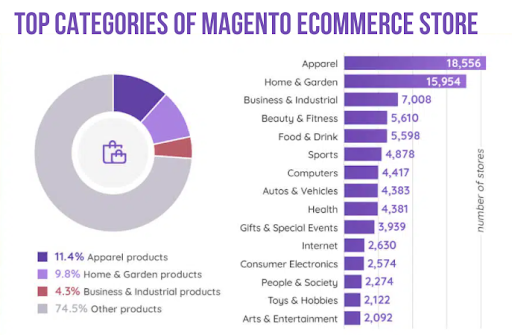
Moreover, Magento can manage websites for B2B and B2C eCommerce companies because of its unique multi-store architecture. Since it’s not limited to one or two types of products or inventory levels, it’s the platform of choice for many companies. You can consult an eCommerce development company to build your website.
PRO #2. Unlike other platforms, it has a lot of features
There are some very cool features you’ll only find on a Magento site. For example, an API (Application Programming Interface) allows third parties to create plugins for Magento.
These make running your ecommerce business easier because they allow you to use specific tools that help streamline or customize your business. Some of these include:
- Advanced Pricing Rules – You can create rules to display prices that reflect the quantity, weight, or size. These rules can be applied automatically when you add new products, and they’re beneficial for configuring special pricing offers.
- Email Marketing – With this feature, your customers receive an automated email when they purchase a product (or similar), and the email contains a link to their order history. The email also includes text and images from your store.
- Advanced Shipping Rules – These rules automate shipping based on multiple variables such as size, weight, price, materials, etc. They’re easy to set up and can help shave time off your operations.
PRO #3. It has a Large Community of Users
Built with an open-source code, Magento is one of the most widely adopted platforms for ecommerce websites. With a large online community, there are always forums where you can ask questions or get help.
This includes volunteers who help by writing free guides and answering questions on the official forum. Magento even has its Stack Exchange site where you can ask a question or find a solution to a problem, and there are over 1,500 members in the community.
The company’s vast network of experienced developers, 8 thousand certified implementation experts, and 5900 competent contributors provide Magento Open Source with a readymade support system that will be available whenever you need it. (Source: Savemycent’s eCommerce statistics)
Moreover, some blogs talk about Magento every day. You can even find a few YouTube channels dedicated to the platform, where experts discuss specific topics related to ecommerce sites and how Magento can help you grow your business.
PRO #4. The platform offers Mobile Friendly Websites
Magento has made its platform responsive/mobile friendly, with an estimated 50% of online sales coming from mobile devices. Magento has made its platform responsive/mobile friendly. This means you don’t need to create a separate app or store for customers using their phones.
Also, Websites with non-mobile-first designs are likely to experience only 20% of gains, while mobile-friendly pages can generate up to 30%.
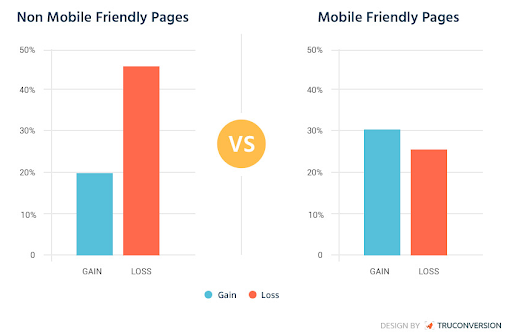
Image Source: Truconversion
Besides, they can browse and buy your site, just like they would on a laptop or desktop computer. Here are some additional benefits to Magento’s mobile platform:
- The website works on all devices, whether a desktop computer or an iPhone/Android phone. Plus, this gives your customers the best experience possible while browsing for products.
- You can also create optimized landing pages to convert consumers into buyers by driving traffic toward high-converting pages with personalized offers.
- Customize the design & layout of your website for mobile users, which allows you to highlight important selling features.
PRO #5. It’s scalable that is built to grow with your business
One of the most appealing characteristics of an ecommerce platform is its scalability, which allows you to expand your business quickly without investing a lot of money on new equipment.
You’ll find this feature in Magento because the platform is built with scalability in mind. It has been used by several big brands that have thousands of users and millions of products. Why? Because it can handle large amounts of traffic, which also means it could do the same for your business.
PRO #6. Magento has many ecommerce integrations with third-party software
Another reason why Magento is one of the most popular platforms is that it integrates with third-party software. Moreover, this makes it easier for you to manage orders, sales, inventory, and other aspects of your business all in one location. Here are some integrations you’ll find with Magento:
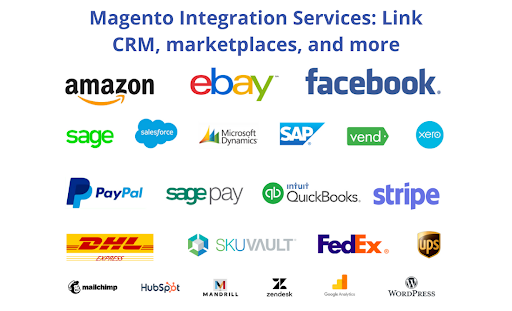
Paypal – You can accept payments from Paypal, one of the most popular and trusted payment processors globally.
Google Analytics – This free tool tracks your marketing campaigns. Also, it allows you to see how many people visited your site, conversion rates, and other important metrics that can help improve your business operations.
Order Management – This feature allows you to manage all orders, inventory, and shipments in one location. It also includes tools to help you better manage your orders based on criteria such as total time of the sale, average order value, product age when sold, etc.
Marketing Campaigns – This integration allows you to create remarketing campaigns for specific products or collections. Besides, if someone visits your website and doesn’t buy anything, you can show them ads about these products later on.
Google Shopping – If you want to sell your product on Google Search and Images, you can use this integration to make it easier for potential customers to find your business online.
PRO #7. Great for SEO purposes
The most significant advantage of using Magento is that it provides an all-inclusive SEO solution right out of the box. What does this imply? For starters, it means that no additional purchases or add-ons are required to optimize your site for search engines. You simply have to activate it, and you’ll be able to start leveraging SEO features right away.
Besides, each time you add a new product or collection page to your Magento site, Magento considers content as one of the most crucial factors for search engine rankings. You can also include advanced metadata such as image titles, descriptions, and even videos.
If you’re not familiar with SEO, these are important factors for search engine bots to understand the page.
PRO #8. It’s a Secure Platform

One major pro of Magento is that it’s very secure. It comes with a set of pre-installed features that are sure to keep your website safe from cyberattacks, hacks, malware, spamming bots, XSS attacks, CSRF attacks, etc.
That doesn’t mean you don’t have to put in extra effort to protect your store. But it takes care of some fundamental security issues for you. You can also customize your security settings to make sure that your website is safe from primary threats.
PRO #9. It offers multiple languages and currencies support
Many business owners use their websites to showcase products internationally, which is why your ecommerce platform needs to be localized. This allows you to deliver products and services to customers from around the world. While many platforms can support multiple languages, not all platforms support additional currencies as well. The good news is that Magento offers just that! In fact, it has been known to attract international businesses because of its ability to support various languages and currencies on a single site.
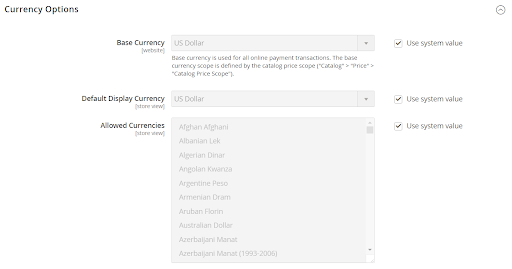
Image Source: Magento
Pro #10. It’s a Universal Platform
It is a cross-platform eCommerce web application that provides the best shopping experience to your customers across all devices. You could build and develop a Magento website on any following platforms: LAMP (Linux, Apache, MySQLi, PHP), Mac OSx, or Windows. The beauty of it lies in the fact that a website built on Magento can be accessed from any device, saving you a lot of extra development time and money. This is just one reason why Magento is considered the best eCommerce platform to use for developing websites.
Cons of Magento eCommerce
Let’s take a look at some potential disadvantages of the Magento eCommerce platform.
CONS #1. High cost of development
Although Magento is an open-source platform, it’s not cheap. The software itself is free; however, its value comes from the customization, integrations, and hosting. This can be a turn-off for some small businesses that are on a tight budget.
CONS #2. It is time-consuming to build and maintain
Because of all the features that Magento offers, it can be overwhelming. The system also has its own set of coding standards and guidelines. This means that to utilize everything Magento has to offer fully – you’ll likely need to hire a web development agency or ecommerce expert.
CONS #3. You need powerful hosting for Magento Open Source
Magento is a powerful ecommerce platform. However, the downside of that power is that it takes more resources to run than some other platforms on the market. If you choose to go with Magneto Open Source, make sure your hosting provider can provide an environment where Magento can operate smoothly. Otherwise, you may experience slow load times and other problems.
CONS #4. Steep learning curve
Using Magento isn’t the easiest thing in the world. It is a highly complex and powerful platform that can do some pretty incredible things, but it takes learning to wield its power effectively. This is especially true if you plan on using a lot of customizations. As previously stated, trying to figure out how everything works might be overwhelming, which may be challenging for some new store owners.
CONS #5. You need to upgrade Magento regularly
Magento is relatively good at staying up to date with the latest features and advancements in technology. However, there are still several instances where things may be done better. To stay up with these developments, you should plan on upgrading your platform every year or two.
Magento eCommerce Pros and Cons
| Pros of Magento eCommerce | Cons of Magento eCommerce |
| Magento provides flexible multi-store functionality | High cost of development |
| Unlike other platforms, it has a lot of features | It is time-consuming to build and maintain |
| It has a large community of users | You need powerful hosting for Magento Open Source |
| The platform offers Mobile Friendly websites | Steep learning curve |
| It’s scalable that is built to grow with your business | You need to upgrade Magento regularly |
| Magento has many ecommerce integrations with third-party software | |
| Great for SEO purposes | |
| It’s a secure platform. | |
| It offers multiple languages and currencies support. | |
| It is a Universal Platform |
Conclusion:
That brings us to the end of this Magento eCommerce pros and cons. Furthermore, we hope this helps you decide whether or not this is the right platform for you. Whatever you decide, we wish you good fortune in your online business endeavors!
Although, if you want to have a customized, high-performing eCommerce website without the hassle of coding and researching for hours to find the right plug-ins and addons yourself, then you should hire a Magento developers.
We provide Magento development company services for all your eCommerce business needs. We specialize in building high-performing, technologically advanced Magento stores designed to improve your business’s bottom line.
FAQs
Q1: What does Magento Ecommerce do?
A1: Magento is a popular eCommerce platform that allows you to sell products online. This open-source software is customizable and can be used for many different businesses, from clothing stores to furniture retailers.
Magento also offers a suite of marketing tools that allow you to promote your products online. For example, it can create a signup form for your site or provide you with customer analytics.
Q2: How much does Magento Ecommerce cost?
A2: Magento is an open-source platform, which means that it can be downloaded for free. However, businesses will need to pay for hosting services and customization. This may factor into your overall costs for using Magento.
Q3: Who uses Magento Ecommerce?
A3: Magento is used by online retailers around the world. Fortune 500 companies like Coca-Cola, HP. AsusTek and Oxo have also used this software to power their eCommerce websites.
Q4: What features does Magento Ecommerce offer?
A4: In addition to being a stand-alone eCommerce platform, Magento offers a suite of add-ons and tools that businesses can use on top of the base product. There are many different Magento add-ons, including improved social media integration and a mobile app.
Read in this Blog – Boost Your Sales – 5 Ecommerce Marketing Strategies
